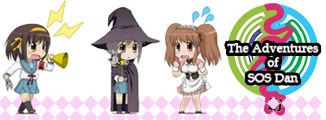|
I always wondered...
Link |
by
|
|
what's the difference between this dragon ç«œ and this é¾ since they both are pronounced the same way and the meaning is the same (as far as i know) also could you tell me how to write Frostburn in japanese, since the word is non-existent the best thing i came up with is éœœç« (shimohi) with exact translation - frostfire, but at least it sounds cool |
|
Re: I always wondered...
|
|
the main difference between ç«œ and é¾ is just mainly for using it for different words, means the same. Its just for different words sake. It also one is harder way then the other.... i think.... im pretty sure im right.... aint i?
引ãã“ã‚‚ã‚ŠãŸã„ãŒå¼•ãã“もる部屋ãŒãªã„...orz
|
|
Re: I always wondered...
Link |
by クラッシワヤー(CrazzyWarrior)
on 2007-03-19 21:34:16
|
|
Return to beginning of the Text Translation function. ç«œé¾ã€‚ * ç«œ ã€ãŸã¤; ã‚Šã‚…ã†ã€‘ (n) (1) dragon; (2) promoted rook (shogi); SP * é¾ ã€ãŸã¤; ã‚Šã‚…ã†ã€‘ (oK) (n) (1) dragon; (2) promoted rook (shogi); SP I just put them into wwwjdic, and if you notice the (n) means noun, the second has (oK), which I looked up and means its an outdated kanji, meaning its not used in modern japanese, you weould most likely see it in older writings rather then newer. Hope that helps a little.  |
|
Re: I always wondered...
|
|
Some kanji (Japanese) are simplified hanzi (Chinese) and I believe this is one case. é¾ is still Chinese for dragon, but ç«œ is only found in kanji. So it's just a simplification, although the full version exists in the Japanese characters, I think it not used except perhaps for ceremonial and "classical" words, and in names. (I think it may be used in shogi, though, as it has gives a special meaning in the game, other than just "dragon")  |
|
Re: I always wondered...
Link |
by
|
| are u shure about the part "being used in names" cause a name containing dragon would be a good one >:D |
|
Re: I always wondered...
|
|
Um, yes, it can be used in names, such as é¾ä¹‹ä»‹. The [outdated kanji] reference can also be applied to 國 and 国. |
|
Re: I always wondered...
|
|
It's in a lot of names, for example é¾æ²» (Ryuuji),é¾é›„ (Tatsuo), é¾å¹³ (Ryuuhei) or just é¾ (Ryuu), and dozens more. The simplified kanji is also in many names, such as 竜一朗 (Ryuuichirou) "Ryuu" is the part that means dragon. It is also said as "Tatsu" in some words.  |
|
Re: I always wondered...
Link |
by
  on 2008-11-08 18:56:55
on 2008-11-08 18:56:55 |
|
Ryuuga also means Dragon right? |
|
Re: I always wondered...
|
|
Foreign names (not a Japanese name like Kawashima or Tachibana or Yamamoto or something else originally Japanese), are written in Katakana. So Frostburn... furosutobaan... would be フãƒã‚¹ãƒˆãƒãƒ¼ãƒ³ Trying to make an American name into kanji can be done (though, it shouldn't be done), but the word won't mean anything in Japanese; it'll just be two words put together ("frost" and "burn"). The Japanese won't see it as a name but a compound phrase. Remember that names DO NOT TRANSLATE. If you're Miguel in Mexico, you are not Michel in France, and you are not Mikhail in Russia, nor are you Michael in America. You're Miguel everywhere you go, even though the foreign country you may be in has their own pronunciation or variation of your name. |
|
Re: I always wondered...
Link |
by mewarmo990
on 2008-11-18 14:34:51
|
|
I hope this clears up any confusion, and addresses a point you people may have missed. é¾ is the traditional Chinese character for "dragon." The traditional character set is primarily used in Taiwan, Hong Kong, Macau, and among most overseas Chinese. ç«œ is the simplified Japanese character, though the traditional version can still be found in certain usages as mentioned by the above posts. é¾™ is the simplified Chinese version, mostly used in the People's Republic of China, Singapore, more recent emigrants from the mainland, and now the United Nations (grrrrr).
Maka here is an wonderful example of why it's a bad idea to home school your children.
Maybe also a good example of why inbreeding is a bad idea, although the paternity test has not been done to say for sure.
-Gendou
|
|
Re: I always wondered...
Link |
by
|
|
actually: é¾ - is used for the CHINESE dragon (with long body, just like shen-rong in dragonball.) ç«œ - the stereotype western dragons. fire-breathing and all. :3 |
|
Re: I always wondered...
|
|
Frostburn cannot be translated in any other way than by Katakanizing it, as dood has done. It reads furosto-ban. Sorry if that steals your thunder, though. It just doesn't have that ring, does it? |
|
Re: I always wondered...
Link |
by
|
|
wow...thanks for this ! now i know the difference.. ;3 |
|
Re: I always wondered...
Link |
by mewarmo990
on 2009-08-30 17:11:34
|
|
Sorry to necro an old thread, but I won't stand for the blind leading the blind. As I said back in 2008, the two characters are simply traditional and simplified versions of the EXACT SAME KANJI. é¾ does still exist in Japanese but is rarely used in everyday writing since Japan's several language reforms. You'll still find it in names and older text. Don't believe any of that BS about one being used for Western dragons and whatnot.
Maka here is an wonderful example of why it's a bad idea to home school your children.
Maybe also a good example of why inbreeding is a bad idea, although the paternity test has not been done to say for sure.
-Gendou
|





